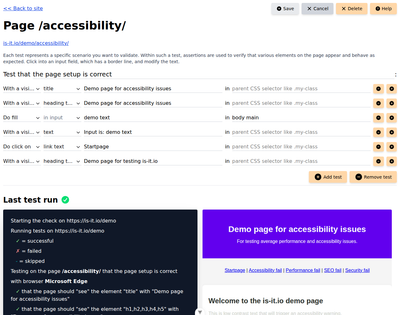In the page view it is possible to define the tests and assertions which should be performed during a check on that respective page.

When test are created, modified or deleted and the page saved. Then is a test run done on the particular page only to quickly see if the tests pass or fail. The progress of the job is shown in the black panel together with a screenshot of the page. The configured browser from the site parameters is used for testing.
Toolbar actions
The toolbar actions offer the possibility to perform some actions on the page.
Save
When some tests are added/modified/deleted, then the save button becomes active and it is possible to save the page. As soon as the page is saved a check is started on the whole site, not only the page to ensure that all is working as expected.
Cancel
The cancel action reverts the changes and goes back to the previous view on the platform.
Delete page
The delete action permanently deletes the page and it's tests. A confirmation dialog double checks if you are sure as when deleted, the tests are gone and when the page is added later, they need to be recreated.
Test section
The test section is the heart of a page and actually describes a use case which should be fulfilled. It contains a title and some assertions. It is an interactive editor where you can click together your test. Basically it is a storyboard which contains actions, like clicking on a link, and assertions which do test special conditions, like if an element contains a text.
1. Title
The title describes the meaning of the test. It should clearly describe what is going to be tested. An example can be "Test that the page contains all the necessary contact fields".
2./3. Assertions
Assertions do actually check if a certain condition is met on the page for an element and some text. If an assertion failed in a test run, then it is highlighted with a red border to quickly identify, failing items. It consists of different parts which will be described below:
Condition/action
The condition/action select box contains two groups of options to select. The action does perform some change on the page like clicking on an element, while the conditions define what to check. It is a select box, grouped either by conditions or actions, with the following values:
- With a visible: Is a condition which performs a check that the rest of the assertion will be performed on a visible text/element
- With a: Is a condition which performs a check that the rest of the assertion will be performed on a visible or hidden text/element
- Click on: Is an action which clicks on an element defined with the rest of the parameters
- Fill: Is an action and fills a specific text into an input element
Element
The element which should meet the requirement. It is a select box with the following values:
- Text: Any text element
- Title: The title element in the head section of the page
- Link: A link element
- Button: A button element
- Heading: A h1, h2, h3, h4, h5 element
- Element: Any kind of element
- Input: The special input
Text
The text part is a free text field where you can input some text which should be found inside the element or the selector of the element when it is of type element, specified before.
Parent selector
The parent selector part is a free text field where you can input a CSS selector to target a specific element where the element specified before should be found. This is necessary when you have multiple links in your page and you want to test a specific one.
Amount field
When the element element is selected, then there is an amount field which allows to put a number of how many times an element should appear on the page.
4. Assertion modifiers
The green + button adds a new assertion below the one where the button is clicked, while the red one removes the assertion.
5. Test modifiers
The green + button adds a new test below the one where the button is clicked, while the red one removes the test.
Keyboard shortcuts
The whole page can be navigated with the keyboard to speed up the writing process. When you hit the enter button, then is a new assertion added. Ctrl + s does save the page and starts a new check with the new changes.
